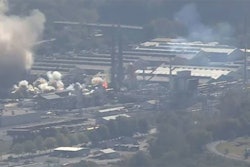WASHINGTON (AP) — President Donald Trump's nominee to oversee chemical safety at the Environmental Protection Agency promised Wednesday to apply sound science in his new job and defended his history on behalf of corporate clients of endorsing far higher exposures to toxins than the government now allows.
The Senate Environment and Public Works Committee was widely expected to approve along party lines the nomination of Michael L. Dourson to become head of EPA's Office of Chemical Safety and Pollution Prevention.
Democrats on the committee, lacking the ability to block Dourson's confirmation, challenged Dourson with open scorn at a hearing.
"This is an absolute atrocity," Sen. Jeff Merkley, D-Ore., said.
Sen. Cory Booker, D-N.J., said, "You're advocating for levels that will poison people." Booker likened Dourson to a Disney villain.
Dourson largely did not respond to criticisms by Democrats. Asked whether he would recuse himself from decisions regarding chemicals made by companies that paid him to evaluate their safety, Dourson repeatedly declined to make such a pledge.
"I'm going to rely on guidance from EPA ethics officials," Dourson said, adding that he has not always reached conclusions favorable to his paying clients.
"I just don't understand why you don't recuse yourself" from matters involving former clients, Sen. Tom Carper, D-Del., said. He pointed to 10 examples where Dourson endorsed chemical exposures far higher than the EPA ultimately concluded was safe.
Dourson's work at the Toxicology Excellence for Risk Assessment — a nonprofit that performs research bankrolled by chemical companies and government agencies — has drawn fire from environmental and public health organizations. His past clients include Dow Chemical Co., Koch Industries Inc. and Chevron Corp, as well as trade associations representing the pesticide, processed food and cigarette industries.
Republicans on the Senate panel questioned Dourson about his philosophical approach and asked how he might deal with what they viewed as the Obama administration's overreach on environmental regulation. All seemed generally satisfied with his answers.
Among the hearing's most dramatic moments came from Sen. Kirsten Gillibrand, D-N.Y., who represents Hoosick Falls in upstate New York, where groundwater is polluted with the chemical PFOA. In 2001, Dourson helped oversee industry-funded research that concluded PFOA exposures of less than 150 parts per billion were likely safe.
Hoosick Falls residents have sickened and died from illnesses believed linked to PFOA, Gillibrand said, despite exposures far lower.
"These families are so frightened," she said, choking up as she spoke. "I can't imagine what it would be like to not know if the water your children are bathed in is safe."
The EPA itself now considers exposures to PFOA levels unsafe as low as 0.07 billion parts per billion.
Separately, Gillibrand pressed Dourson to explain recommendations from a 2002 report for West Virginia he oversaw that found levels of 2,000 times that limit were acceptable.
"The science has progressed significantly," Dourson said. He said he did not know the research was funded by DuPont, although DuPont's funding was acknowledged when the report was commissioned.
Sen. James Inhofe, R-Okla., said he was comfortable with Dourson's motivations, noting that both he and Dourson have children and grandchildren.
"Despite what the critics today think," Inhofe said, "we want them to grow up in a healthy environment."






















